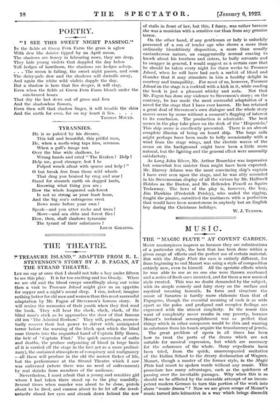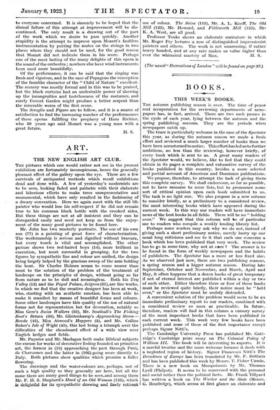- 31 IT S I G.
THE " MAGIC FLUTE " AT COVENT GARDEN. MANY masterpieces impress us because they are culminations of a particular style, the best that has been done within a given range of effects and the perfect use of certain material. But with the Magic Flute the case is entirely different, for from beginning to end Mozart was using a style of composition entirely new, even to himself. All the operatic effects which he was able to use as no one else were thrown overboard and a series of fresh ones invented, and for them a new musical style created. This was no doubt demanded by the subject, with its simple comedy and fairy story on the surface and mystical meaning beneath. In form and structure the music of Sarastro is hardly more elaborate than that of Papageno, though the essential meaning of each is as wide apart as the poles and profound and complex feelings are expressed with the utmost simplicity. In the music this want of complexity never results in any poverty, because Mozart's technical accomplishment was so perfect that things which in other composers would be thin and wanting in substance from his touch acquire the translucency of jewels.
The great problem of opera in all times has been how to treat the parts of the drama which are not suitable for musical expression, but which are necessary for the coherence of the whole. Many expedients have been tried, from the quick, unaccompanied recitative of the Italian School to the dreary declamation of Wagner. Mozart, though a master of the former style, in the Magic Flute had resort to spoken words without any music. This procedure has many advantages, such as the quickness of passing over the inevitable passages. Why when this is so should we be afflicted by the miserable attempt of an incom- petent modern German to turn this portion of the work into sham "music drama" ? Now we are given scraps of Mozart's music turned into leitmotivs in a way which brings discredit
to everyone concerned. It is sincerely to be hoped that the dismal failure of this attempt at improvement will be dis- continued. The only result is a drawing out of the part of the work which we desire to pass quickly. Another stupidity is the attempt to improve upon Mozart's faultless instrumentation by putting the mutes on the strings in two places where they should not be used, for the good reason that Mozart did not indicate them in his score. Perhaps one of the most lasting of the many delights of this opera is the sound of the orchestra ; nowhere else have wind instruments been used more beautifully.
Of the performance, it can be said that the singing was fresh and vigorous, and in the case of Papageno the conception of the faunlike character of the " Child of Nature " excellent- The scenery was mostly formal and in this was to be praised, but the black curtains had an undesirable power of showing up the incongruities and tastelessness of the costumes, and surely Covent Garden might produce a better serpent than the miserable worm of the first scene.
The Seraglio and Figaro are to follow, and it is a source of satisfaction to find the increasing number of the performances of these operas fulfilling the prophecy of Hans Richter, who 80 years -ago said Mozart was a young man with a great future. H. S.



















































 Previous page
Previous page